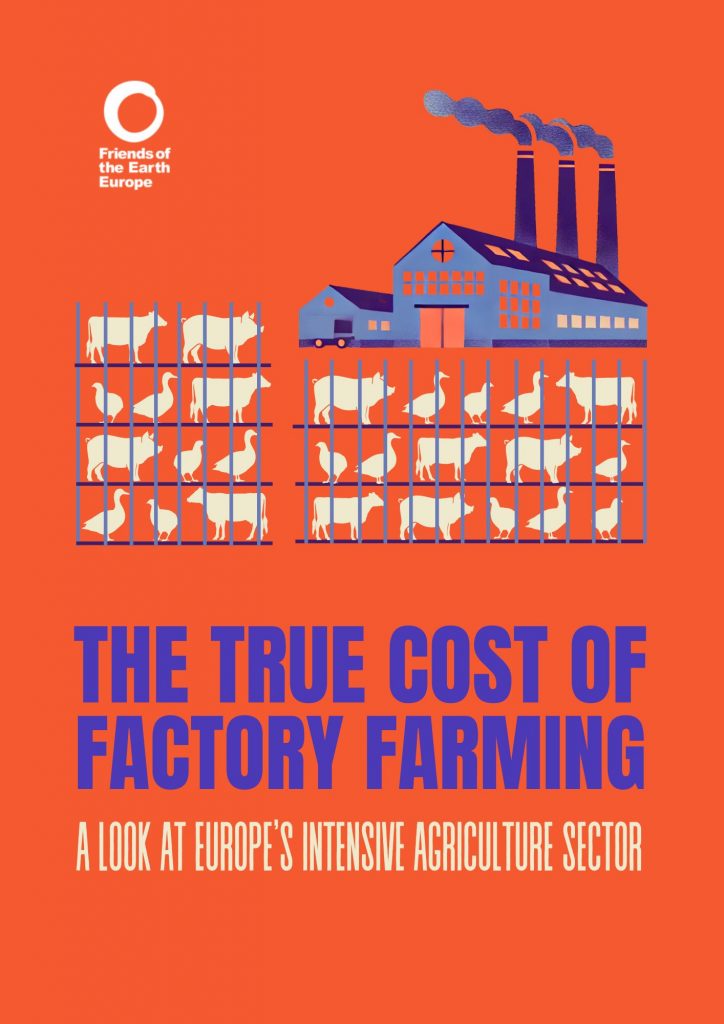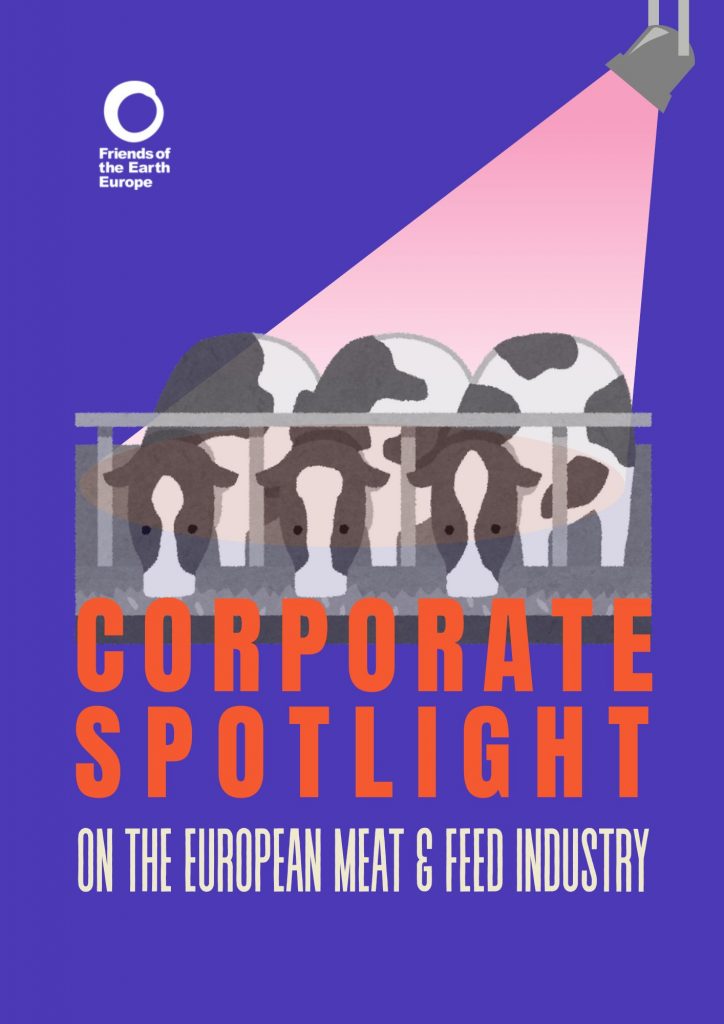The future of European animal farming sector has been central in the 2024 Strategic Dialogue on EU Agriculture. Its outcome report proposes that the European Commission ’set up a process for developing a strategy on the key role of animal farming based on robust scientific evidence and the consultation of all stakeholders concerned’ – a process welcomed by Friends of the Earth Europe who as has long warned decision-makers of the severe impacts of intensive animal farming – or animal factories, factory farming – for local communities and nature.
Below, we outline key issues lying with the agricultural sector as it currently operates, and most importantly, transformative actions. For more detailed information, check out our two new briefings on the true cost of factory farming and on the corporate takeover of the meat industry.


The true cost of factory farming
The factory farming model wreaks environmental, climate and social havoc, putting workers’ rights and human health at risk. It produces substantial greenhouse gas emissions and reduces genetic diversity so drastically it puts the entire food supply chain at risk. In Europe, half of the animal breeds that existed at the turn of the 20th century went extinct, and 53% of the remaining local breeds are at risk.
Local communities living in the vicinity of those installations face, and for several million of people even have to drink, polluted water from excessive nitrate and ammonia waste, increasing the risk of waterborne diseases. The cramped and unhygienic conditions of factory farms are also a major risk factor for future pandemics and increased antibiotic resistance.
Read more: resistance stories from the ground
Friends of the Earth Europe produced a series of testimonies and portraits from across Europe, highlighting the courageous efforts of local communities and activists resisting the harmful impacts of animal factories. This series aims to help shed light on the challenges and victories of those on the front lines, fighting for nature protection, animal welfare and healthy rural communities. Read the stories from Hungary, Northern Ireland, Spain, Denmark here.
The impact extends beyond Europe. In Latin America, soy production – largely for animal feed – has increased tenfold over 50 years,driving deforestation, illegal landgrabbing and more human rights abuses against local communities, workers and small farmers.
Focus on the pig sector
With the poultry sector, these are Europe’s most intensive farming systems, characterised by high stocking densities, indoor rearing and fast-growing breeds obtained by genetic selection. Spain’s pork sector exemplifies the industry’s impacts, with the number of farms dropping by 61% in just a decade and 80% of the remaining ones now intensive, leading to rampant nitrate pollution and record use of antimicrobial. Similarly, in Denmark, large-scale pig facilities dominate, and have captured the political space, leaving locals with little recourse to resist their expansion.
Across the EU, pig farms are disappearing, but production has grown. By 2022, 75% of EU pigs were raised in are in large commercial operations.
Corporate takeover of the meat industry
A few big corporations dominate global agricultural markets, with four giants – ADM, Bunge, Cargill and Louis Dreyfus – controlling 70% of agricultural commodity trade. These Big Meat and Dairy are linked to unchecked carbon emissions, unfair business practices, worker exploitation, animal welfare violations, pollution, and lobbying against crucial climate policies designed to protect people and the planet from corporate exploitation.
For instance, Vion is a member of The European Livestock and Meat Trades Union (UECBV), a lobbying association that has disputed the science of climate change and downplayed the role of the agriculture sector. Their lobbying significantly weakened key areas of the EU’s Farm to Fork Strategy and opposed any mandatory due diligence legislation for commodities like soy and meat that carry a risk of deforestation in their supply chains. And despite promises to monitor soy supply chains in Brazil, LDC actively oppose environmental protections and Indigenous rights.
Transforming the sector: policy solutions
The damage caused by industrial agriculture is clear, but alternative food systems that protect and restore biodiversity, provide nutritious food and defend the rights of farmers exist. Policymakers must take bold steps to regulate factory farming,hold corporations and their financiers accountable, and support a sustainable transition.
Policymakers must:
- Take urgent action and introduce concrete measuresto reduce production and consumption of industrial meat and dairy farming.
- Ban factory farming and reduce the number of intensively farmed animals in the EU.
- Stop the direct and indirect support for industrial livestock production through CAP subsidies, and instead support sustainable small-scale livestock producers and other actors in the food chain involved in processing and marketing of animal products.
- Enforce environmental and food legislation to stop the damage of industrial livestock production, including implementation of the Water Framework Directive and the Nitrates Directive.
- Place legally binding restrictions on feed imports, such as soy, that are linked to deforestation and rights violations.
- Develop an EU transition fund for workers at factory farms and the meat industry to shift into more sustainable jobs.
- Limit the lobby access of big corporations to EU and national policy making.
- Renegotiate international trade agreements like EU-Mercosur to eliminate trade of products that contribute to deforestation, degradation of natural ecosystems, or weaken social and labour rights, environmental, animal welfare or food safety standards.
We also call for:
- Strong transposition of the new Corporate Sustainability Due Diligence Directive at the member state level, to hold companies and financiers accountable for their impacts on human rights and the environment.
- No more delays or attempts to weaken the EU Deforestation Regulation.







